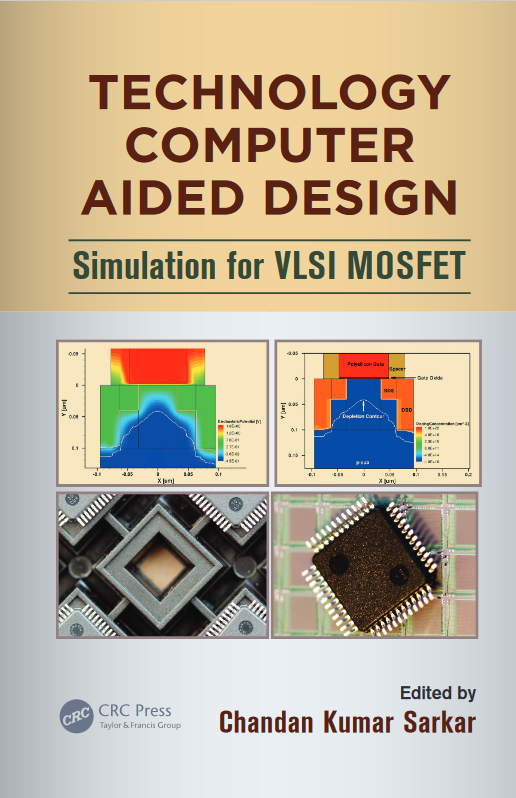Newly released
This book is new and will be uploaded as soon as it becomes available to us and if we secure the necessary publishing rights.

Technology computer aided design : simulation for VLSI MOSFET Book PDF
(0)
Author:
Chandan Kumar SarkarNumber Of Reads:
114
Language:
English
Category:
fieldsSection:
Pages:
445
Quality:
excellent
Views:
1191
Quate
Review
Save
Share
Book Description
Responding to recent developments and a growing VLSI circuit manufacturing market, Technology Computer Aided Design: Simulation for VLSI MOSFET examines advanced MOSFET processes and devices through TCAD numerical simulations. The book provides a balanced summary of TCAD and MOSFET basic concepts, equations, physics, and new technologies related to TCAD and MOSFET. A firm grasp of these concepts allows for the design of better models, thus streamlining the design process, saving time and money. This book places emphasis on the importance of modeling and simulations of VLSI MOS transistors and TCAD software. Providing background concepts involved in the TCAD simulation of MOSFET devices, it presents concepts in a simplified manner, frequently using comparisons to everyday-life experiences. The book then explains concepts in depth, with required mathematics and program code. This book also details the classical semiconductor physics for understanding the principle of operations for VLSI MOS transistors, illustrates recent developments in the area of MOSFET and other electronic devices, and analyzes the evolution of the role of modeling and simulation of MOSFET. It also provides exposure to the two most commercially popular TCAD simulation tools Silvaco and Sentaurus.
Emphasizes the need for TCAD simulation to be included within VLSI design flow for nano-scale integrated circuits
Introduces the advantages of TCAD simulations for device and process technology characterization
Presents the fundamental physics and mathematics incorporated in the TCAD tools
Includes popular commercial TCAD simulation tools (Silvaco and Sentaurus)
Provides characterization of performances of VLSI MOSFETs through TCAD tools
Offers familiarization to compact modeling for VLSI circuit simulation
R&D cost and time for electronic product development is drastically reduced by taking advantage of TCAD tools, making it indispensable for modern VLSI device technologies. They provide a means to characterize the MOS transistors and improve the VLSI circuit simulation procedure. The comprehensive information and systematic approach to design, characterization, fabrication, and computation of VLSI MOS transistor through TCAD tools presented in this book provides a thorough foundation for the development of models that simplify the design verification process and make it cost effective.
Chandan Kumar Sarkar
received his MSc in physics from Aligarh Muslim University, Aligarh, India, in 1975 ; his PhD from Calcutta University, Kolkata, India, in 1979; and his DPhil from the University of Oxford, Oxford, UK, in 1983. He was also postdoctoral research fellow of the Royal Commission for the Exhibition of 1851 at the Clarendon Laboratory, University of Oxford, from 1983 to 1985. He was a fellow of Wolfson College, Oxford. He was atutor and lab instructor at Clarendon Laboratory. He was also a visiting fel-low with the Linkoping University, Linkoping, Sweden; Max Planck Instituteat Stuttgart, Germany. He joined Jadavpur University, Kolkata, in 1987 as areader in electronics and telecommunication engineering. Subsequently, he became a professor and the head of the Department of Physics, and dean of Faculty of Science Bengal Engineering Science University (BESU) during 1996–1999. Later he once again joined Jadavpur University ETCE Department as a professor. He has served as a visiting professor in many universities such as the Tokyo Institute of Technology, Japan and Hong Kong University, Hong Kong. Since 1999, he has been a professor with the Department of Electronics.
Book Currently Unavailable
This book is currently unavailable for publication. We obtained it under a Creative Commons license, but the author or publisher has not granted permission to publish it.
Rate Now
5 Stars
4 Stars
3 Stars
2 Stars
1 Stars
Technology computer aided design : simulation for VLSI MOSFET Quotes
Top Rated
Latest
Quate
Be the first to leave a quote and earn 10 points
instead of 3
Comments
Be the first to leave a comment and earn 5 points
instead of 3